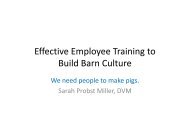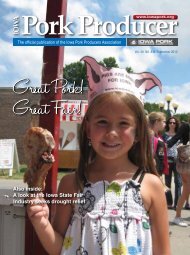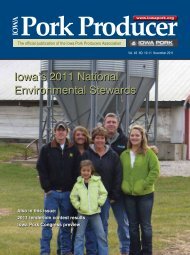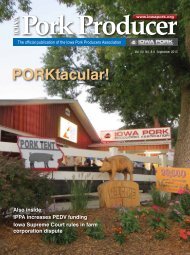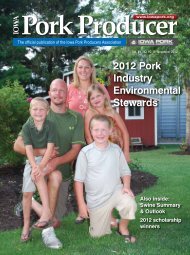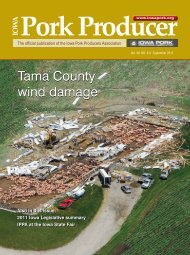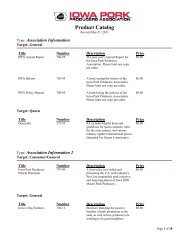Pork Congress 2012 - Iowa Pork Producers Association
Pork Congress 2012 - Iowa Pork Producers Association
Pork Congress 2012 - Iowa Pork Producers Association
Create successful ePaper yourself
Turn your PDF publications into a flip-book with our unique Google optimized e-Paper software.
News from the<br />
National <strong>Pork</strong> Board<br />
Checkoff research helps wage war<br />
against PRRS<br />
Porcine Reproductive and Respiratory Syndrome<br />
(PRRS) is a formidable and costly enemy to<br />
fight, but extensive research funded by the <strong>Pork</strong><br />
Checkoff is helping the pork industry gain ground<br />
in the battle against the tenacious virus.<br />
“The <strong>Pork</strong> Checkoff is committed to finding<br />
practical solutions to this very complex disease<br />
through investments in research,” said National<br />
<strong>Pork</strong> Board President Everett Forkner. “Whether<br />
it’s looking at real-time challenges, such as the<br />
implementation of regional elimination, or longterm<br />
issues, such as determining genetic resistance<br />
to PRRS, the Checkoff is involved on the research<br />
frontlines on producers’ behalf.”<br />
To aid producers, the <strong>Pork</strong> Checkoff recently<br />
mailed producers a copy of the 40-page PRRS<br />
Initiative Research 2004-2011 Report, which offers<br />
a comprehensive reference on the evolution of<br />
PRRS research and can help with the development<br />
of herd health management strategies, said Lisa<br />
Becton, director of swine health information and<br />
research for the <strong>Pork</strong> Checkoff.<br />
“Thanks to the breadth of the research that has<br />
been gathered in recent years, our understanding<br />
of PRRS is increasing by leaps and bounds,” said<br />
Becton, noting that the PRRS Initiative Research<br />
program, supported by the <strong>Pork</strong> Checkoff ’s Swine<br />
Health Committee, has funded 123 projects<br />
totaling more than $10 million since 2004. “There<br />
are definite things producers can do to control<br />
PRRS from getting in their operation.”<br />
Checkoff supports new flu naming<br />
Before the current flu season got into full swing,<br />
the <strong>Pork</strong> Checkoff, the National <strong>Pork</strong> <strong>Producers</strong><br />
Council and the American <strong>Association</strong> of Swine<br />
Veterinarians met with USDA and the U.S. Centers for<br />
Disease Control and Prevention (CDC) about influenza.<br />
The objective was to find accurate ways to describe<br />
influenza viruses that prevent confusion about pork’s<br />
safety.<br />
The CDC, along with international human and animal<br />
health agencies, recently announced that it will now<br />
refer to influenza viruses that normally circulate in<br />
animals and may infect humans as “variant influenza<br />
viruses,” designated by a “v.” For example, the recent<br />
human cases of influenza A(H3N2) that contain<br />
components of human, avian, swine and H1N1<br />
influenzas are now called influenza A(H3N2)v.<br />
“This will allow the media to use more accurate<br />
terminology to communicate to consumers and will<br />
help reinforce to consumers that you cannot get the<br />
flu from eating or handling pork,” said Dr. Jennifer<br />
Koeman, director of producer and public health for the<br />
<strong>Pork</strong> Checkoff.<br />
Research shows less bedding needed<br />
during hog transport<br />
Texas Tech and <strong>Iowa</strong> State University researchers<br />
have found that the pork industry can generally use<br />
less bedding year-round than it currently does while<br />
improving overall animal well-being - a breakthrough<br />
finding that could save the industry an estimated $10.1<br />
million per year.<br />
The results are from a new study funded by the <strong>Pork</strong><br />
Checkoff.<br />
John McGlone, a swine researcher at Texas Tech<br />
University and principal researcher for the study, along<br />
with Anna Butters-Johnson an <strong>Iowa</strong> State University<br />
researcher, looked at various rates of bedding in<br />
semi-trailers at different times of year and in different<br />
locations throughout the Midwest. This approach<br />
provided data representing cold, mild and hot weather.<br />
58 March <strong>2012</strong>




